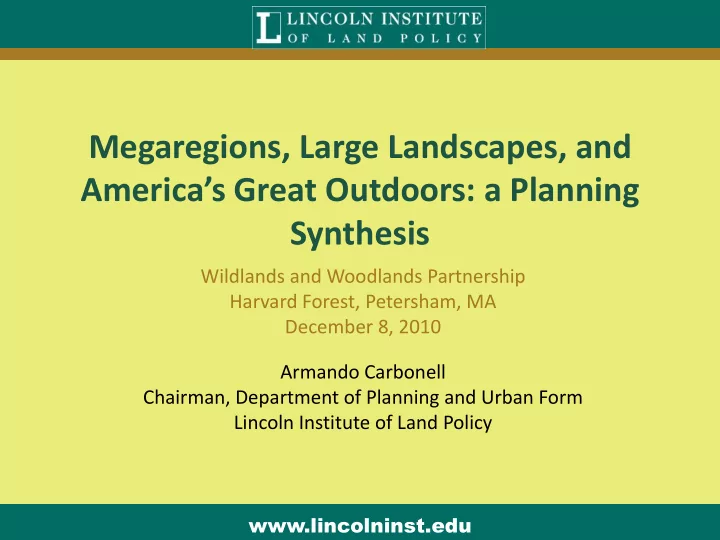

Megaregions, Large Landscapes, and America’s Great Outdoors: a Planning Synthesis Wildlands and Woodlands Partnership Harvard Forest, Petersham, MA December 8, 2010 Armando Carbonell Chairman, Department of Planning and Urban Form Lincoln Institute of Land Policy www.lincolninst.edu
Precedents and early insights …
The Blue Banana
European Mega-regions and Territorial Cohesion Credit: Lincoln Institute of Land Policy
U.S. Population Change 2005-2050 Credit: University of Pennsylvania
Rural Areas Projected to Experience Increased Development, 2000-2030 Source: USFS Open Space Strategy
Emerging U.S. Megaregions Credit: University of Pennsylvania
Why Megaregions? • Challenges occur at scale greater than metropolitan region • Large infrastructure systems • Large natural systems • Building blocks to a national plan 10
Northeast Megaregion
Gottmann’s Megalopolis
Northeast Megaregion Ecostructure
Smart Growth vs. Trend Growth
Vision : Dense Hubs connected by high-speed transport Population density per square mile Source: U.S. Census 15
National Resources Planning Board and the Interstate System Early interstate plan, from “Toll Roads and Free Roads,” National Resources Planning Board and Bureau of Public Roads, 1939 National System of Interstate Highways, Public Roads Administration, 1947
Passenger Rail Network Intercity Passenger Network 17
Freight Network Diagnostic National Freight Map 18
Shrinking cities and thinly populated places…
Composite Index of Underperforming Characteristics Number Nu r of Percent nt of Population ation Rank Counti nties tot otal Population ation 1970 2006 2006 Percent nt Change 0 1, 1,107 36% 36% 104,58 ,587, 7,456 456 191,3 1,345,88 45,884 83% 83% 1 707 23% 23% 33,699, 99,69 693 44,099, 99,72 727 31% 2 645 21% 48,416, 6,403 403 47,284, 4,43 431 -2% 2% 3 419 14% 12,783,66 83,669 11, 1,703,0 703,076 -8% 8% 4 221 7% 7% 2,115, 5,528 528 1, 1,733,0 3,019 -18 18% 3,099 201, 1,602,7 602,749 49 296,166, 66,137
Underperforming Counties Rank 3 4
With the Exception of the Great Lakes Underperforming Counties are outside of the Megaregions
Seven Underperforming Regions Identified Northern Rockies Great Great Lakes Plains Appalachia / Rust Belt Mississippi Delta Deep South Rio Grande Valley
Megaregion Forums to Set Priorities Sacramento, Dec 2, 2008 Chicago, November 17, 2008 24
www.America2050.org www.rpa.org 25
Wide open spaces…
10 Most Endangered Rivers Source: American Rivers
Biodiversity Hotspots (most species, biggest threats) Source: The Nature Conservancy
North American Wildlife Corridors Source: The Wildlands Project
Climate Change
America’s Great Outdoors: 21 Landscape Conservation Cooperatives USFWS
Roundtable on the Crown of the Continent
Where is the Crown?
Naming the Landscape George Bird Grinell coined the term “Crown of the Continent” Blackfeet Nation called this area the “Backbone of the World”
The Place 18 million acre intact eco-region • 83% of the land in public ownership • Headwaters for 3 oceans • 4 ecosystems converge • – Old-growth cedar-hemlock rain forests in the west – Native short-grass prairies in the east – High alpine meadows – Variations north and south
First Nations The Crown is nested in a much larger territorial homeland
Communities About 200,000 people in the Crown Over 1 million in the surrounding area
Special Designations 2 national parks • 1st international • peace park Biosphere reserve • 3 Wild and Scenic • Rivers 5 wilderness areas • 5 endangered • species
Richest biodiversity of plant and animal life in North America 1200 vascular plants 16 species of carnivores
Threats to People and Land Energy and resource development Residential/commercial development Economic stagnation/transformation Habitat fragmentation Climate change Wildfire management Capacity to Respond Lack of regional identity Fragmented efforts & jurisdictions BUT , an opportunity to be proactive Employ both bottom-up and top- down solutions and governance
.
Contact/more information Armando Carbonell Chairman, Department of Planning and Urban Form Lincoln Institute of Land Policy 113 Brattle Street Cambridge, MA 02138 617-661-3016 email@lincolninst.edu Website: www.lincolninst.edu www.lincolninst.edu
Recommend
More recommend